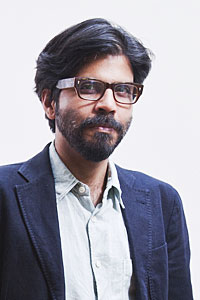The election of Donald Trump, whose campaign trafficked in racism and misogyny, as the president of the United States is a calamity. But And to those who have witnessed the subsequent radical makeover of India under Mr Modi, the prospect of Mr Trump assuming supreme power brings on acute foreboding.
For what is threatened now in the US is not just free trade, liberalism or a technocratic and professional class of politician accused of being out of touch with ordinary people. It is democracy itself -- the central project of the modern world, in which people come together to form a political community that defines its shared laws, ensuring dignity and equal rights for each citizen, irrespective of ethnicity, race, religion and gender.
Anguish and despair must quickly give way to a fuller reckoning with the deeper reasons behind Mr Trump's empowerment. We must ask: Where do we stand, and where do we go from here?
Here the Indian experience can be instructive, if not uplifting. For over a decade, Mr Modi was on the fringes of India's political and intellectual life. Accused of supervising mass murder and gang rapes in the state of Gujarat in 2002, he was blocked from travelling to the US and Europe. Journalists and pundits hailed technocrats such as former prime minister Manmohan Singh, an Oxford-educated economist, for their secular outlook as well as economic wizardry.
Mr Modi's moment came only when economic growth, which had been largely jobless, began to falter. Corruption scandals exposed the liberal technocrats as a self-aggrandising and inept elite, and the political party most identified with them -- the Congress Party -- was engulfed by a devastating crisis of legitimacy.
The stage was then set for Mr Modi to rise. And so he did, eerily anticipating Mr Trump with the accusation that his country was run by a foreigner (the Italian-born Congress leader Sonia Gandhi) and traitorous liberals, and overrun by Muslims and immigrants. To complete the analogy with Mr Trump, Mr Modi also boasted about the size of a male body part -- his chest -- while promising to make his country great again.
Mr Modi's electoral base was among Indians who felt cheated out of nearly double-digit but unevenly distributed growth. He managed to persuade them that the choicest fruits in India were being stolen by an arrogant and deceptive elite that promised meritocracy but perpetuated dynastic rule.
As Tocqueville pointed out long ago, people in the democratic age "have an ardent, insatiable, eternal, invincible passion" for equality, and "will tolerate poverty, enslavement, barbarism, but they will not tolerate aristocracy". In the eyes of the aggrieved, the liberal accusation against Mr Modi -- that he was menacingly authoritarian -- became an asset.
Two years of Mr Modi in power have confirmed that he is a demagogue of a particular kind: one that has periodically emerged, since the 19th century, from a radically disillusioning experience of liberal democracy, from the latter's failure to confer dignified citizenship or distribute equitably the benefits of economic growth.
It is now Mr Trump's turn to benefit from this angry disillusionment with oligarchic dynasts. His advent, astoundingly simultaneous with that of other demagogues, confirms that the US has reentered the history of the modern world after its long 20th century exemption from political chaos that almost all other countries suffered. What happens next depends greatly on how America's democratic institutions respond to Mr Trump. And, here, India's example is severely discouraging.
Hindu nationalists are colonising state and society in India with contemptuous ease, staffing political and cultural institutions with loyalists. "Hinduise all politics and militarise Hindudom," VD Savarkar, the chief ideologue of Hindu supremacism and Mr Modi's hero, once exhorted. This old fantasy of upper-caste Hindus is now finally being realised under the leader with a 56-inch wide chest. Clamouring for retributive violence against Kashmiri Muslims and Pakistan.
In many ways, the electoral apotheosis of a Hindu supremacist in 2014 has proven to be less shocking than the zeal of many affluent Indians, including former fans of the uber-technocrat Manmohan Singh, to rally to his side. Tocqueville may have been right to say that a "taste for well-being easily comes to terms with any government that allows it to find satisfaction". In the US, much hope rests with those who refuse a similarly craven accommodation with a white supremacist. ©2016 Bloomberg View
Pankaj Mishra, a Bloomberg View columnist, is an essayist and novelist based in India and London.
